Climate change to bring wild weather to Britain: Scientists blame global warming for record heatwaves, rainfall and rising sea levels in 2023
According to the Met Office, the record weather conditions in the UK over the past 12 months are due to climate change.
In its annual State of the Climate report, the Met Office said 2023 was the warmest June on record, the warmest September on record and the year as a whole was the second warmest year on record for the UK.
Analysis of weather data shows that human-induced climate change has made the likelihood of these events occurring “much greater.”
“Our country is getting warmer and wetter at an accelerating pace,” said Gareth Redmond-King, head of the international programme at the Energy and Climate Information Unit.
‘The impacts of climate change are felt everywhere, as are more frequent and intense extreme weather events in all parts of the world.’
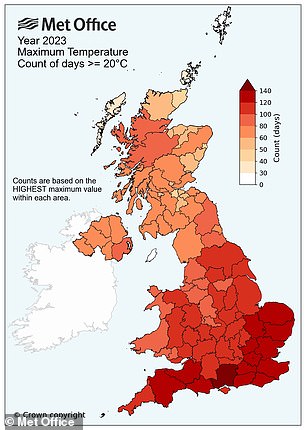
2023 had the warmest June on record, the warmest September on record and the year as a whole was the second warmest on record for the UK.
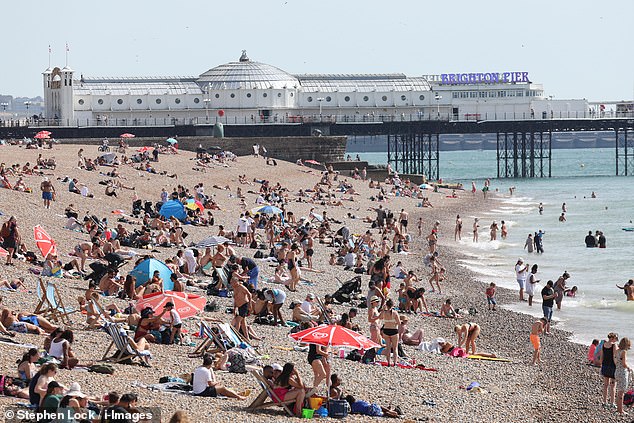
Analysis of the weather data shows that human-induced climate change made this data ‘much more likely’. Pictured: Brighton beach in September 2023
To illustrate how the UK has become warmer, the Met Office reported that between 1961 and 1990, only London and Hampshire recorded six or more days of temperatures of 28°C or higher. This is considered ‘hot’ weather by the Met Office.
But in the last decade, between 2014 and 2023, much of England and Wales saw six or more days with temperatures above 28°C, while many more counties in the South East now see around 12 days above 28°C.
The report shows that the number of ‘pleasant’ days (maximum 20°C per day) has increased by 41 percent over the past decade (2014-2023) compared to 1961-1990.
Meanwhile, the number of ‘warm’ days (25°C) has increased by 63 percent, the number of ‘hot’ days (28°C) has more than doubled and the number of ‘very hot’ days (30°C) has more than tripled over the same period.
Overall, the past decade was on average 0.42°C warmer than the 1991-2020 average and 1.25°C warmer than 1961-1990.
The report also states that we are increasingly seeing the wettest days.
The UK has seen 20 percent more days of exceptional rainfall over the past decade compared with the average period from 1961 to 1990.
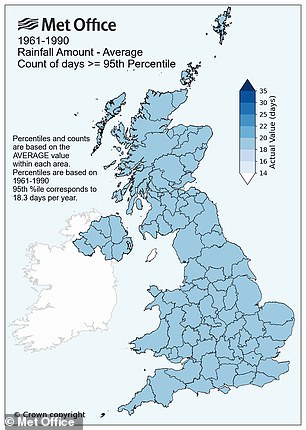
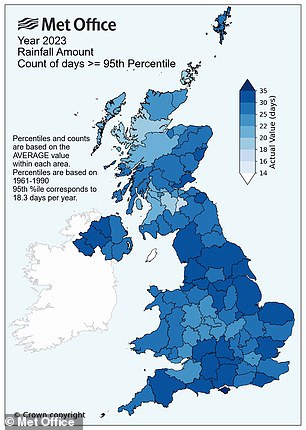
The UK has had 20 percent more days of exceptional rainfall in the past decade compared to the average period from 1961-1990
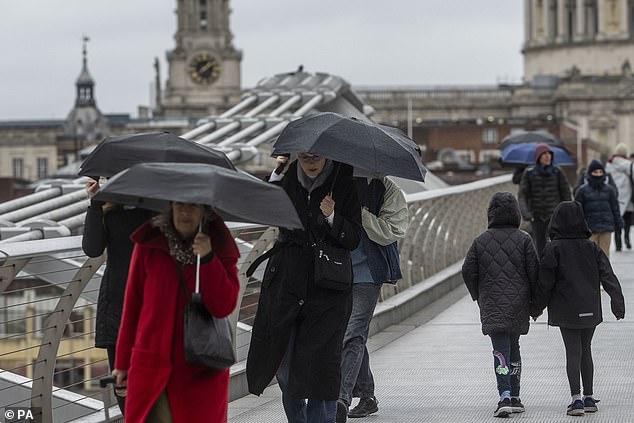
The year was also stormy, with seven named storms between September and December. Pictured: Storm Gerrit hits London in December 2023
It was also a stormy year, with seven storms between September and December. The most destructive storm was Storm Babet, which brought heavy rain and flooding.
According to the Met Office, Storm Ciaran on November 2 had the potential to be as severe as the ‘Great Storm’ of October 16, 1997, but the strongest winds missed the UK in the south.
The storm killed 21 people across Europe.
Lead author and Met Office climate scientist Mike Kendon said: ‘Our new analysis of these observations really sheds light on the most rapidly changing aspects of our weather as a result of climate change.
‘People find it hard to wrap their heads around long-term averages, but what we show here is the striking change in the frequency of extreme weather, which can have a real impact on people’s lives.
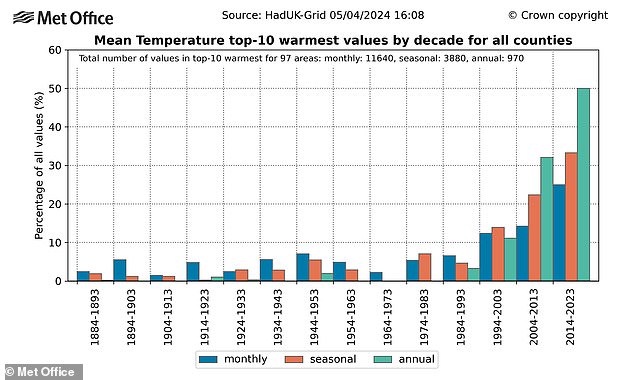
Overall, the past decade was on average 0.42°C warmer than the 1991-2020 average and 1.25°C warmer than 1961-1990.
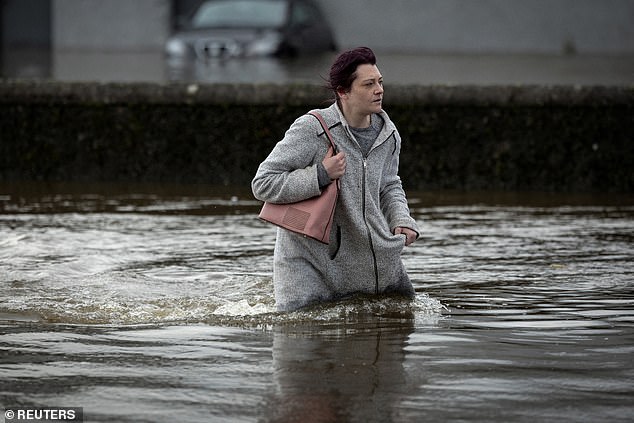
Storm Ciaran on November 2 had the potential to be as severe as the ‘Great Storm’ of October 16, 1997, the Met Office said, but the strongest winds missed the UK in the south. Pictured: A woman braves Storm Ciaran in Newry, Northern Ireland
‘2023 was again a year with interesting and sometimes meaningful weather.
‘From the UK’s warmest June by far, to a significant heatwave in September and the most active start to the storm naming season, culminating in severe flooding problems in the autumn, it was another year of typically changeable weather.
‘But beneath this natural variability lies an ongoing and increasing influence of climate change, which is affecting the weather we experience.’
Professor Liz Bentley, Chief Executive of the Royal Meteorological Society, said: ‘The new analysis of days classified as ‘warm’ or with ‘exceptional rainfall’ highlights the increased frequency of high-impact extreme weather events we are already experiencing in the UK. The attribution studies help us understand how human activities, such as the burning of fossil fuels, are making these extreme events much more likely as our climate continues to change.’
Mr Redmond-King added: ‘Many Britons holidaying in Spain, Italy, Greece and parts of the US will face dangerously high temperatures this summer, with extreme heat causing wildfires, crop damage and deaths.’
